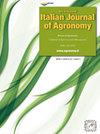有机农业与传统农业:土壤化学性质的中期评估
IF 2.1
3区 农林科学
Q1 AGRONOMY
引用次数: 0
摘要
农业管理通过农艺措施的频率和类型影响土壤肥力,如机械操作、肥料的类型和速率、作物轮作和残留物管理。这项研究评估了在意大利东北部两个有机和常规管理的农业系统建立5年和14年后,土壤化学性质(pH值、电导率、土壤有机碳SOC、总凯氏氮TKN和有效磷PO4-P)随时间的演变。有机碳含量在传统农业系统中保持稳定,但在有机农业系统中略有下降,尽管有机改良剂提供了投入。相比之下,有机农业系统中的土壤TKN始终较高。在两种耕作系统中,PO4-P都随时间增加。此外,我们观察到,土壤粘土含量增加1%,SOC和TKN分别增加0.0534和0.0053 g kg–1。总之,我们的研究结果表明,在土壤有机质积累方面,有机管理并不比传统管理具有优势。亮点-在该系统建立14年后,有机管理并没有增加土壤有机碳含量。-在传统系统中,土壤有机碳随时间的推移是稳定的有机农场的土壤有机氮高于传统农场有机和常规管理中的土壤C/N比<10,表明矿化活跃。本文章由计算机程序翻译,如有差异,请以英文原文为准。
Organic versus conventional farming: Medium-term evaluation of soil chemical properties
Agricultural management affects soil fertility through the frequency and type of agronomic practices such as mechanical operations, type and rate of fertilizers, crop rotations, and residue management. This study evaluated the evolution of soil chemical properties (pH; electrical conductivity; soil organic carbon, SOC; total Kjeldahl nitrogen, TKN; and available phosphorous, PO4-P) over time in two farming systems, organically and conventionally managed, after 5 and 14 years after the establishment of both systems, in northeastern Italy. SOC content remained stable in the conventional farming system, but slightly decreased in the organic farming system, despite inputs from organic amendments. In contrast, soil TKN remained consistently higher in the organic farming system. The PO4-P increased over time, in both farming systems. Moreover, we observed that an increase of 1% in soil clay content resulted in increases of 0.0534 and 0.0053 g kg–1 in SOC and TKN, respectively. In conclusion, our results indicate that organic management does not have an advantage over conventional management in terms of soil organic matter accumulation.
Highlights - Organic management did not increase soil organic carbon content 14 years after the system was established. - The soil organic carbon was stable over time in the conventional system. - Soil organic nitrogen was higher in the organic farm than in the conventional farm. - Soil C/N ratios in organic and conventional management were <10, indicating active mineralization.
求助全文
通过发布文献求助,成功后即可免费获取论文全文。
去求助
来源期刊

Italian Journal of Agronomy
AGRONOMY-
CiteScore
4.20
自引率
4.50%
发文量
25
审稿时长
10 weeks
期刊介绍:
The Italian Journal of Agronomy (IJA) is the official journal of the Italian Society for Agronomy. It publishes quarterly original articles and reviews reporting experimental and theoretical contributions to agronomy and crop science, with main emphasis on original articles from Italy and countries having similar agricultural conditions. The journal deals with all aspects of Agricultural and Environmental Sciences, the interactions between cropping systems and sustainable development. Multidisciplinary articles that bridge agronomy with ecology, environmental and social sciences are also welcome.
 求助内容:
求助内容: 应助结果提醒方式:
应助结果提醒方式:


